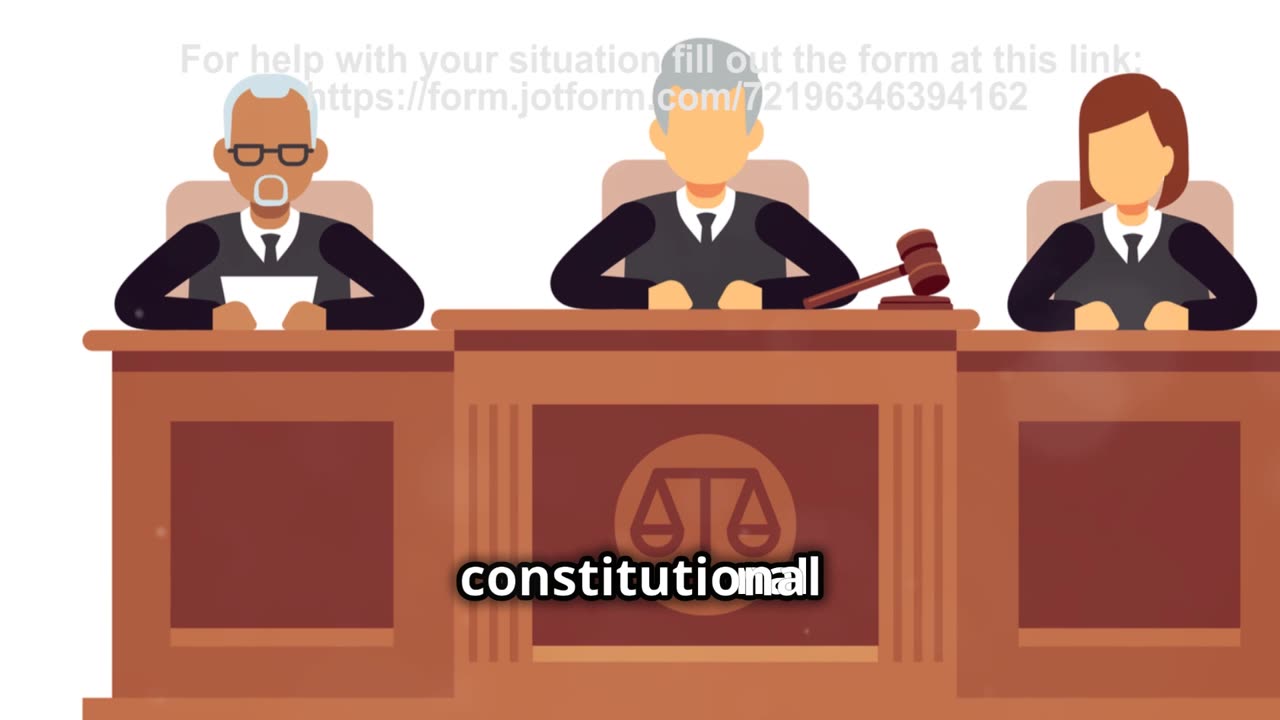Premium Only Content

DISMISS THE JUDGE AND VOID HIS ADJUDICATION
DISMISS THE JUDGE AND VOID HIS ADJUDICATION
For help with your situation click on the link here and fill out the form:
https://form.jotform.com/72196346394162
Thank you for your help in Restoring the Constitutional-Republic one county at a time.
PLEASE CONTACT US HERE ABOUT YOUR SITUATION: https://form.jotform.com/72196346394162
This link is in the description of the video.
In this important video we discuss how to DISMISS ANY CASE, GET OUT OF JAIL, IMPEACH THE JUDGE, VOID JUDGMENT, NULLIFY JUDGMENT, UNDER RULE 60(b)(4) REQUEST VACATION OF JUDGMENT
Every case that is brought by the STATE is void; for example, STATE OF FLORIDA v. JOHN DOE. That's right; that case is VOID.
Here's Why: In the Constitution of the United States, in Article III it establishes in two instances in which the United States Supreme Court has exclusive personal jurisdiction and that is,
1) anytime a foreign dignitary is named a party,
and,
2) anytime the STATE is named a party.
So anytime a STATE takes a side against you in any case, then the United States Supreme Court has jurisdiction, exclusive personal jurisdiction. That means that no other court in the nation has authority to oversee that particular case.
Now in all cases, where the STATE has chosen to take a side such as Taking the side of the accuser; there's always two parties in a complaint. There's a party of the accuser and there's a party of the
accused. It's the petitioner and the defendant. So when the STATE chooses to take a side of the petitioner, then that means that it must recuse itself from acting as the judge in the case because Article III, Section 2 of the United States Constitution says: "In all cases in which a STATE shall be Party, the Supreme Court shall have original Jurisdiction,"
So no other court has the authority to be able to oversee that particular case and the judges in every STATE were bound by anything in there which created that obligation and those judges had a duty and
obligation to recuse themselves anytime the STATE became party in the cause.
Failure to have the Supreme Court hear the case nullifies the case. It renders it void. And so under Civil Rule 60(b)(4), you're able to then request vacations of those judgments.
Every case where the Judge fails to uphold the US Constitution, which is a failure to perform his duty, is a violation of his Oath of Office. This is an impeachable offense. The judge is no longer in good standing.
The Judge takes an "Oath of Office" to support and defend the Constitution of the United States, within Article VI, it says specifically: "…the judges in every state shall be bound thereby anything in the Constitution or laws of any states contrary notwithstanding."
So as a result the Judge is no longer fit to continue in the office as a Judge and thus is immediately impeached.
So any actions performed from that moment forward under the court is obviously going to be void. It's going to be rendered void because no judge can continue to sit in his office after committing perjury because perjury is, of course, a violation of trust. So at that point, they no longer have jurisdiction.
Jurisdiction:
Jurisdiction is removed anytime that you have a judge that acts without jurisdiction he's at the point of "WARRING" against the Constitution and anything that's rendered from that moment forward is going to be rendered void and not valid.
Under Federal law which is applicable to all states, the U.S. Supreme Court stated that if a court is "without authority, its judgments and orders are regarded as nullities. They are not voidable, but simply void; and form no bar to a recovery sought, even prior to a reversal in opposition to them. They constitute no justification; and all persons concerned in executing such judgments or sentences, are considered, in law, as trespassers." Elliot v. Piersol, 1 Pet. 328, 340, 26 U.S. 328, 340 (1828)
Judges and prosecutors have absolute immunity unless they totally lack subject-matter or personal jurisdiction in the case. A judge acting without subject-matter jurisdiction is acting without judicial authority. Cohens v. Virginia, 19 U.S. (6 Wheat) 264, 404, 5 L.Ed 257 (1821)
The U.S. Supreme Court, in Scheuer v. Rhodes, 416 U.S. 232, 94 S.Ct. 1683, 1687 (1974) stated that "when a state officer acts under a state law in a manner violative of the Federal Constitution”, he "comes into conflict with the superior authority of that Constitution, and he is in that case stripped of his official or representative character and is subjected in his person to the consequences of his individual conduct. The State has no power to impart to him any immunity from responsibility to the supreme authority of the United States." [Emphasis supplied in original].
Denied provisions in the constitution. $250,000.18 USC 3571
Violation of Oath of Office, $250,000 fine. See: 18 USC 3571
Conspiracy against rights:
In the case Barron v. Baltimore, the court said the "Bill of Rights, which is the first ten amendments to the United States Constitution, that they are not a restriction against the state governments, but only a restriction against the federal government.
United States Bill of Rights: https://en.wikipedia.org/wiki/United_States_Bill_of_Rights#Application_and_text
Conspiracy against rights, $250,000 fine. See:18 USC 242
If your case was or is without a Grand Jury Indictment; Clause 1 of Amendment V says:
"No person shall be held to answer for a capital, or otherwise infamous crime, unless on a presentment or indictment of a Grand Jury."
If the court failed to give you your Constitutional Rights; Article VI, it says specifically:
"the judges in every state shall be bound thereby anything in the Constitution or laws of any states contrary
notwithstanding." Failing to give those rights to the individual IS A CRIME.
Deprivation of rights under color of law, $1,000 fine. See: 18 USC 241
If your case was or is without a Jury Trial; Article III, it says: "the trial of all crimes, with the exception of impeachment, shall be by jury, and the trial shall occur in the state wherein which the crime is said to have been committed."
Article VI of the United States Constitution, it says specifically, "the judges in every state shall be bound thereby anything in the Constitution or laws of any states contrary notwithstanding."
So, the real hitch pin resides with state judges. The state judges, they swear an oath to support and defend the Constitution of the United States, but within Article VI, it says specifically, "the judges in every state shall be bound thereby anything in the Constitution or laws of any states contrary notwithstanding."
So the Constitution establishes a contract. It's a social contract between the people. We gave it to the government, said governance in accordance with these procedures and processes. So what it does is it establishes obligations; because that's all that a law is. A law is simply an obligation.
So I have the obligation to not kill someone, or I have an obligation not to speed my car, or I have an obligation not to assault someone. If I breach my obligation, if I breach my duty, then that would result in a violation of someone's
rights. So rights always derive from another's duty to act, okay? So where there is no duty, there cannot be right. Now, an obligation can be seen from two different perspectives.
From the one bound, the obligation is a duty and from the one entitled the obligation is a right. So you don't actually have any rights until someone else breaches their duty to act, and that's really, really important here because most civil rights cases, they end up failing in procedural defaults because they want to come out and say that they
have rights, like I have this right that's been violated. But before you have that right, you must first establish that someone else had a duty to act, or else you have no case. You have no argument. And that's why most cases, civil rights in particular, that's why they fail in procedural default is that they fail to recognize the fact that before you have a right that has been violated, you must first establish that someone else had a duty to act, and they breached that duty, and as a result, then it caused a violation of your rights. And then you can move forward with
your case in particular.
And so, for the last 245 years, not one single United States citizen has ever been protected by all the provisions and guarantees of the United States Constitution, and that's egregious failure of the justice system, particularly headed by the highest court in our land.
So the way it works is that when the Supreme Court of the United States, being the highest court in the land, all of the courts within the jurisdiction of the United States all have to answer to it. So when they put out a ruling that's contrary to law or unconstitutional or illegal, then that would immediately impeach the judges.
Because remember, what it says is, in Article III, it says: "the trial of all crimes, with the exception of impeachment, shall be by jury, and the trial shall occur in the state wherein which the crime is said to have been committed."
Now, what does that mean?
It says that all crimes except for impeachment shall be by trial by jury. Why is it that impeachment is not included in the list? Because impeachment is a per se - by or of itself - incident.
You don't have to have a jury question whether or not the crime has been committed by simply virtue of failing to fulfill the obligations defined within the Constitution of the United States, failing to give those rights to the individuals IS THE CRIME.
What the judges are there to do to is to fulfill the obligations defined within the Constitution of the United States. They are to ensure that the people are given the rights. The people have the right to due process law because the judges in every state have the duty to ensure that those rights are provided, So the peoples rights derive from the Judges breach of duty. So when the judge fails to perform his duty and his obligation established by law and
Constitution in particular, then that results in a violation of the peoples right.
Failure to perform those obligations as defined within it, is a breach of legal duty. It's an impeachable offense. It's a per se offense. Therefore, you don't have to have a jury in place to be able to determine whether or not there's a finding of facts. The fact is they breached their duty which resulted in a violation of your rights and as a result, they're immediately impeached because Article III says: “that the judges, both the United States and of several states, shall maintain their office while in good behavior.”
Good behavior is defined as the avoidance of criminal behavior.
So the moment that a judge engages in criminal behavior, he's no longer fit to continue in his office and is thereby discharged.
Now, we know that perjury is the result of failure to fulfill the obligation. So anytime that they fail to do their job, because they promised, they made a promise through the oath of affirmation that they will do what the Constitution says, that promise is for a future date, a future time. And so if they fail to perform that at that future time, of course, that results in the violation of their oath which is the crime of perjury and they've already implicitly accepted punishment as a result of a failure to perform. So when they don't fulfill the promise, that results in the violation of the right. It's an impeachable offense. They're no longer in good standing and so as a result they're no longer fit to continue in their office and thus are immediately impeached. So any actions performed from that moment forward under the court is obviously going to be void. It's going to be rendered void because no judge can
continue to sit in his office after committing perjury because perjury is, of course, a violation of trust. So at that point, they no longer have jurisdiction. Jurisdiction is removed.
Anytime that you have a judge that acts without jurisdiction, of course, he's at that point warring against the Constitution and anything that's rendered from that moment forward is going to be rendered void and not valid.
So according to Civil Rule 60, which deals with judgments and the removal of judgments, a judgment is either valid or it is void. It's valid in all cases except for when the court rendered the decision when it lacks subject matter jurisdiction or personal jurisdiction.
Now subject matter jurisdiction is the right to oversee the type of case brought before it. So for instance, in the case of a death, you wouldn't take it to a small claims court because they wouldn't have subject matter jurisdiction to oversee the disposition of those deceased assets, right? They would take it to a probate court because a probate court is the one that would have, of course, subject matter jurisdiction.
Now personal jurisdiction is the right to oversee the parties involved in the dispute.
So in the Constitution of the United States, it establishes in Article III two instances in which the United States Supreme Court has exclusive personal jurisdiction and that is,
One: anytime a foreign dignitary is named a party and,
Two: anytime the state is named a party.
So anytime a STATE takes a side against you in any case, then the United States Supreme Court has jurisdiction, exclusive personal jurisdiction. That means that no other court in the nation has authority to oversee that particular case.
Now in all cases, the state is chosen to take a side, right? Taking the side of the accuser, right? So there's always two parties in a complaint. There's a party of the accuser and there's a party of the accused. It's the petitioner and the defendant. So when the state chooses to take a side of the petitioner, then that means that it must recuse itself from acting as the judge in the case because Article III, Section 2 of the United States Constitution says: "In all cases in which a STATE shall be Party, the Supreme Court shall have original Jurisdiction,"
So no other court has the authority to be able to oversee that particular case and the judges in every state were bound by anything in there which created that obligation and those judges had a duty and obligation to recuse themselves anytime the state became party in the cause.
Failure to do so doesn't validate the conviction. It actually nullifies it. It renders it void. And so under Civil Rule 60(b)(4), you're able to then request vacations of those judgments.
See Also: Crimes Committed Under the Color of Law
PLEASE CONTACT US HERE ABOUT YOUR SITUATION: https://form.jotform.com/72196346394162
This link is in the description of the video.
Quotes and dialog: A man is simply a product of his environment.
So if our leaders are leading us toward criminality, then we're going in the wrong direction, obviously. We need to turn, we need to go a different way. We don't want to be led into criminality because obviously, then we're going to start producing criminals as a result of it.
So before we can deal with the criminality of the people, we first must deal with the criminality of the leadership of this country. We need to have the country going in the proper direction by people that are choosing to be obedient to the law and not violate it. And until we do that, we can't actually hold people accountable because what they're
doing is they're acting outside of the law.
Anytime you act outside of the law, then that's unlawful. It's lawlessness. And so you can't have convictions where there is no law because they're already operating under law.
Part of what I'm about to explain is the hierarchy of law.
We've got a very specific structure of law that was supposed to have the Constitution of the United States, be the foundation and everything was to derive from that. The opposite of constitutionalism or the opposite of the Constitution would be case law or judge-made rulings.
And so when we have a flip, basically a flip of the architecture of our legal doctrine, where the Constitution is supposed to be the base and judges are supposed to go to it to determine whether or not a constitutional violation has occurred. And instead, they go to a judge-made ruling from 1884 to make a determination as to whether or not constitutional rights have been violated.
Obviously, we've got it completely upside down then. These judges, when they go to a judge-made ruling, a decision that's the opposite of the Constitution, to make a determination as to whether or not your constitutional rights have been violated that is absolutely contrary to the Constitution, and it results in a highly discriminatory system, a criminal enslavement system, as opposed to a criminal justice system.
Because then what happens is that then you have the ability for judges to alter or amend the Constitution of the United States based upon their own social, political, or public policy, which is something known as legal realism. And that is absolutely contrary to the Constitution, and it results in a highly discriminatory system, a criminal enslavement system, as opposed to a criminal justice system, which is exactly what we have today.
Therefore we must rebuild this temple of liberty. We have to rebuild justice. We have to flip it back over with the Constitution at the foundation and everything deriving from it. And unfortunately, that means that there's going to be a whole lot of cases that are going to have to be reconciled. They're going to have to be rendered void. So this is an opportunity for our country to start over. Start over without the slavery institution being a part of it. Because when our forefathers and founders, when they started our country, they started what was known as an egalitarianism type of government, which is the belief that all men are equal.
Well, unfortunately, when you have an egalitarianism type of government or form of government, you have to
have all men actually start out equal. And if you don't, then you have a discriminatory system, one that can actually create classes of people. And so we have the ability to perpetually discriminate built into the system. Fortunately, with an egalitarianism government, the law will ultimately treat everyone the same.
So, if we start out with enslaving people because our forefathers and founders refused to give up their property, then unfortunately, we're going to have a system that's going to have the ability to perpetually discriminate and result in an enslavement of people. And so ultimately, every single man, woman, and child will be enslaved by the system if we don't correct it and reconcile it. And this is probably the only opportunity we're going to have, but we've got to bring everyone up to an equal status. We've got to start over like it should have been done 245 years ago.
And that's what we seek to do. We are not doing it to destroy anything. We are not doing it because of money. we are not doing it because we think that these people need to get over on whatever it was that they did.
What we are doing here is what's in the best interest of the country.
We're trying to get us to move forward where we have a sustainable system, a sustainable life, where we can actually look up to the Constitution of the United States for our needs and our sustenance every day and know that we can have faith and believe in it because the system's adhered to it. Without that structure, we live in chaos and
we can't live in chaos.
We must have our leadership of this country abide by the laws of the United States because that's the only thing that binds the nation together. Each one of these states are bound by the laws of the United States. There's nothing else that does it. So, absent the faith in the Constitution of the United States, absent our belief in the Supreme Law of the land, there is no land. There is no nation. So, we need to return to the faith of our design system, okay?
So, this is the letter that remanded my case to the United States Supreme Court. The great philosopher Nietzsche once said, Those who fight monsters should see to it that in the process they don't become a monster.
There are two vastly opposing legal doctrines at work in America at this time.
One: Our system of government is founded upon the "government of laws" doctrine, which is constitutionally based. It's built upon the theory that in order for laws to be legitimate, they must be considered just and equal. This is the egalitarianism approach which our Constitution is framed upon. In order for all men to be equal, government and laws must first treat them equal. This is the way that our system is designed to work based upon a fixed set of laws and principles in which the courts and people adhere to and which every United States citizen is accustomed to.
Two: The opposite of the "government of laws" doctrine is the legal realism doctrine, which is very much alive and at work here in America, destroying our system of government and infringing on the rights of the people. Legal realism, of course, is the theory that law is not based upon a formal set of rules or principles, but instead upon judicial decisions, deriving from their own social, political, or public policy. This is not constitutionally based, as it does not permit the fair and equal treatment of people.
An excellent example of legal realism is the belief that a judge made ruling such as Hurtado v. California can alter the provisions or guarantees of the United States Constitution.
When one attempts to combat the doctrine of legal realism, they oftentimes utilize horrible judicial decisions, such as Plessy v. Ferguson or Dred Scott v. Sanford, whereby the United States Supreme Court Chief Justice Roger B. Tany stated in his dissenting opinion that, "blacks are not and were not intended to be included, under the word citizen, in the Constitution. Blacks are so far inferior that they have no rights which a white man is bound to respect. Slaves are private property protected by the Constitution."
I don't think there's a single United States citizen alive today who can help but feel shame and anger at the horrible words spoken by the highest member of the highest court in our land. There's no doubt that that decision came at a time of great conflict for a nation, and clearly biased in sympathy of itself.
The alteration of the Constitution in order to perpetuate slavery is not approved by God and should never be supported by good men.
What has happened has happened, but to deny it would be a great travesty. You see, a slave-based system cherishes ignorance because that's the only security for its oppression.
Slavery is the mortal antagonist to our republican institution. Truth is the only thing which people can be certain of, but truth doesn't cease to be true simply because no one has the courage to speak up to defend it, or because someone else disagrees with it. Truth is never dependent upon the consensus of opinion.
If a thousand people believe something to be foolish, yet one person ought to be true, it is still true. Truth can never be made a lie, and more than a lie can be made truth.
The truth is that slavery by any other name is still slavery. Simply re-titling it justice doesn't make it any less appalling. Changing it from a private institution to a state-run institution doesn't make it any more constitutionally acceptable. It is still slavery, and it is still a horrible injustice and wrong against humanity, regardless of what you call it or how you disguise it.
PLEASE CONTACT US HERE ABOUT YOUR SITUATION: https://form.jotform.com/72196346394162
This link is in the description of the video.
While we're on the topic of truth, let's produce some more truth.
In the case of Plessy v. Ferguson, there were 8 of the 9 United States Supreme Court justices who all dissented the opinion that blacks are not people, and therefore not entitled to the provisions and protections of the United States Constitution. In this case, there was one single brave Supreme Court justice who dissented with the rest, stating, “our Constitution is colorblind, and neither knows nor tolerates classes among citizens. With respect to civil rights, all citizens are equal before the law.”
This brave patriot was Justice John Marshall Harlan, and this wasn't the only time he found himself as the lone dissenter against every other justice on the United States Supreme Court. One other such instance was in the case of Hurtado v. California.
You see, the truth is that the same 8 of the 9 United States Supreme Court justices who said that slaves are private property protected by the Constitution, also said the United States citizens are not protected by the provisions and guarantees of the Fifth Amendment.
The truth is the same 8 of the 9 United States Supreme Court justices who said that blacks are not people, also said that the United States Constitution is not the supreme law of the land, and does not enjoy legal superiority over conflicting provisions with state constitutions and laws.
The truth is that the same 8 of the 9 United States Supreme Court justices, who said that blacks are far inferior to white men, also said that geographical discriminations are acceptable under our Constitution and government.
The truth is the same 8 of the 9 United States Supreme Court justices who said that blacks are not, and were not intended to be included on the word citizen in the Constitution, also said that states have the right to bridge the privileges and immunities of United States citizens.
The truth is the same 8 of the 9 United States Supreme Court justices who allowed their political interests for the advancement of an industry to cloud their good judgment, also put into practice a ruling intended to advance that industry under a different name, overstepping the separation powers and legislating from the bench in violation of United States Constitution and the oaths of the offices in which they serve.
George Washington voiced his concern about geographical discriminations in his farewell address whereby he stated: "In contemplating the causes which may disturb our union, it occurs as a matter of serious concern for the characterizing of parties by geographical discriminations whence designing men may endeavor to excite a belief that there's a real difference of local interests and views."
Foreseeing the potential for dissension here in America, Mr. Washington advised vigilance against the first dawning of every attempt to alienate any portion of our country from the rest or to enfeeble the sacred ties which now link together the various parts.
The bonds which unite us as one people are origin, language, belief, and laws. These are the four great ties that hold our whole society together. The Constitution binds the American people to goals that are incompatible with slavery.
President Abraham Lincoln said, "It has long been a grave question whether any government not too strong for the liberties of its people can be strong enough to maintain its own existence in great emergencies." Supreme Court Justice Thurgood Marshall echoed this sentiment when he said, "Grave threats to liberty often come in times of urgency when constitutional right seems too aggravating to endure."
The strongest bond which holds our nation together is the faith in the laws between us. This is not the United States of California or the United States of Washington. We didn't serve our country in the military fighting for Texas or Alabama. We were defending America as we are now and as we will continue until such time as God or death has relieved us of this obligation.
It's time now for the courts to do the same. Here's some more truth. The truth is the United States citizens are governed by the laws of the United States. The truth is the United States citizens are guaranteed the rights secured by and enumerated in the Constitution of the United States. The truth is that no person can be held to answer for capital or otherwise infamous crime unless on the presentment or indictment of a grand jury. The truth is that one brave Supreme Court Justice did the right thing and stood for American principles at a time of great peril and his sage wisdom can be trusted today. God bless Justice John Marshall Harlan.
The truth is the United States citizens can believe and have faith in the United States Constitution because the truth can always be trusted to fight battles. The truth can always defend itself as long as there's someone with the courage to speak it.
The role of government is to govern but that role to govern must be fair. Government ceases to govern when it chooses to take sides. It's no longer governing but rather ruling. Every citizen is entitled to fair and equal governing in the same way that every citizen is entitled to the equal protection of laws. Thomas Jefferson voices to us when he said, "Bear in mind this sacred principle that though the will of the majority is all case to prevail that will to be rightful must be reasonable that the minority possess their equal rights to which equal law must protect and to violate would be oppression."
To understand the rationale behind Article III, Section 2 of the United States Constitution which states, "In all cases in which a State shall be Party, the Supreme Court shall have original Jurisdiction," we can turn to the author himself and the words that he published in The Federalist, Circular Number 10, New York Packet, November 23rd, 1787. The article is titled "The Union as a Safeguard against Domestic Faction and Insurrection." In the article James Madison said, “No man is allowed to be a judge in his own cause; because his interest would certainly bias his judgment, and, not improbably, corrupt his integrity. With equal, nay with greater reason, a body of men are unfit to be both judges and parties at the same time.” States cannot be and were never intended to be both judge and party at the same time because the bias prejudice impartiality which would ultimately transpire as a result of it. States cannot be both accuser and judge or else innocence will suffer.
So in the same way and for the same reasons why Tanawah M. Downing versus State of Washington and the current civil action is unconstitutional so also is State of Washington versus Tanawah M. Downing in the original criminal action is unconstitutional. If 1 plus 2 equals 3 is unconstitutional then obviously 2 plus 1 equals 3 is also unconstitutional. Simply rearranging the order of the parties does not magically change the representation of the parties.
Article 3, Section 2 of the United States Constitution clearly states, "In all cases in which a State shall be Party, the Supreme Court shall have original Jurisdiction." State of ILLINOIS v. CITY OF MILWAUKEE, WISCONSIN, et al. Syllabus
The State of Illinois has filed a motion for leave to file a bill of complaint against four Wisconsin cities and two local sewerage commissions for allegedly polluting Lake Michigan. Illinois seeks to invoke the Court's original jurisdiction on the ground that the defendants are instrumentalities of Wisconsin and that this suit is therefore one against the State that must be brought in this Court under Art. III, § 2, cl. 2, of the Constitution which confers original jurisdiction on the Court '(i)n all cases . . . in which a State shall be a party,' and 28 U.S.C. § 1251(a)(1), which provides that the Court shall have 'original and exclusive jurisdiction of (all) controversies between two or more States . . ..'
Under 28 U.S.C. § 1251(b)(3) the Court has 'original but not exclusive' jurisdiction of actions by a State against citizens of another State, and under § 1331(a) a district court has original jurisdiction 'of all civil actions wherein the matter in controversy exceeds $10,000 ...and (arises) under the Constitution (or) laws . . . of the United States.' Held: To Continue Syllabus go to: https://www.law.cornell.edu/supremecourt/text/406/91
As a result both Tanawah M. Downing v. State of Washington and State of Washington v. Tanawah M. Downing are illegal and therefore unconstitutional and the only court with jurisdictional authority to resolve both matters is the court which had jurisdictional authority in the case to begin with which is the United States Supreme Court in accordance with the United States Constitution.
Our forefathers who framed our constitution were simple yet wise men. They weren't establishing complex principles or elaborate institutions to have only rich or educated or noble statuses could understand. You see they were simply trying to create a legal accounting system which adequately and fairly reconciled the debt owed to society. If you choose to violate the law you incur a debt to which you are charged and then called to account so you can pay the debt.
Now these are all very simple accounting terms. Now the way the debt normally works is if I want to purchase something from a store, a bill will first be generated which I sign and accept. Then my account is charged and I incur a debt which I then have to pay. This is a very simple method for transactions to which anyone can understand. However if the store charges the person's account without billing them first that is called fraud you must always bill before a charge is generated.
Now how all this applies in this case is that an indictment is called a bill. So absence in an indictment people are being charged fraudulently because they're not being billed first. Understanding this now anyone who claims that a bill of indictment is not first needed before charging someone's account doesn't understand the basic principles and practices of the system which they're dealing with.
As a result of this very basic fundamental element of our nation's legal accounting system being ignored millions of United States citizens have incurred illegal and fraudulent debt. America must address this flaw in our nation's legal accounting system. In accordance with rule 23 Class Actions of the https://www.law.cornell.edu/rules/frcp/rule_23 rules of civil procedure and in light of all the aforementioned evidence as well as the supporting evidence petitioner asked the United States Supreme Court to authorize the application of the class action advice in this habeas corpus proceeding.
Included within Addendum 3 the court will find the names of only a few of the thousands of petitioners who filed a written habeas corpus pursuant to TITLE 28 U.S.C 2254 between April 10, 2019 and September 2019 whose cases raised the exact same argument and who were illegally and unconstitutionally dismissed by the district court despite the jurisdictional error and who are all now entitled remaining of the case to United States Supreme Court for legal and constitutionally acceptable adjudication.
One last point for this video is that every single thing that we are advocating is consistent with God's divine attributes. Release of prisoners, return of exiled captives, love in lieu of hate, compassion not condemnation, forgiveness instead of vengeance, equity not tyranny. Content is derived Respectfully and peacefully, the servant of Justice, Tanawah M. Downing.
http://articleatlas.com is here to help you with your annual credit report, credit repair, cease and desist letter, credit history, credit rating. http://articleatlas.com
PLEASE CONTACT US HERE ABOUT YOUR SITUATION: https://form.jotform.com/72196346394162
This link is in the description of the video.
-
 4:27
4:27
Restore the Republic One County at a Time
4 months agoSue Tow Truck Companies When They Tow Your Car
5936 -
 LIVE
LIVE
tacetmort3m
19 hours ago🔴 LIVE - (MERRY CHRISTMAS) TIME TO SPREAD DEMOCRACY - HELLDIVERS 2 OMENS OF TYRANNY
64 watching -
 12:42
12:42
Cooking with Gruel
18 hours agoBrown Butter Trifle with Salted Caramel and Cinnamon Apple
7591 -
 2:46
2:46
BIG NEM
6 hours agoDiscovering RAKIJA: The Holy Liquer of the Balkans
442 -
 1:11:38
1:11:38
Film Threat
11 hours agoCHRISTMAS DAY CHILL STREAM WITH CHRIS GORE | Hollywood on the Rocks
123K24 -
 14:22:40
14:22:40
The Quartering
1 day agoYule Log Christmas MAGA Edition With Memes! Come Hang Out!
213K29 -
 38:41
38:41
MYLUNCHBREAK CHANNEL PAGE
1 day agoTimeline Begins in 1800? - Pt 1 & 2
94.6K49 -
 1:23:41
1:23:41
Game On!
1 day ago $13.01 earnedNetflix NFL Christmas Games Preview and Predictions!
84.9K13 -
 2:05:07
2:05:07
Darkhorse Podcast
1 day agoWhy Trump Wants Greenland: The 257th Evolutionary Lens with Bret Weinstein and Heather Heying
313K726 -
 8:50:58
8:50:58
Right Side Broadcasting Network
1 day ago🎅 LIVE: Tracking Santa on Christmas Eve 2024 NORAD Santa Tracker 🎅
412K62